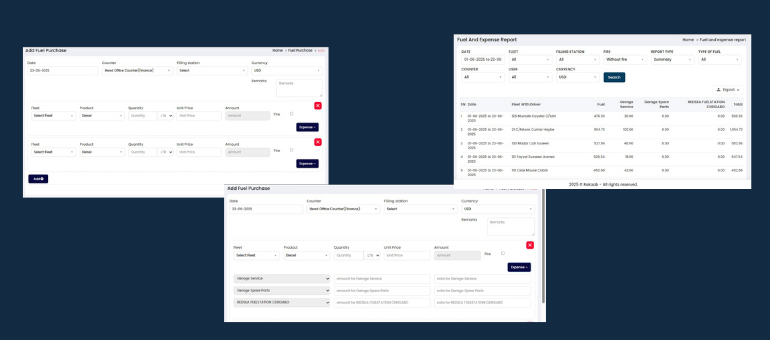Running a bus business isn’t easy. There are drivers to manage, routes to plan, and schedules to keep. But one cost can quietly drain your profits—Fuel. If you’re not keeping track of it, even full buses won’t guarantee you success in the long run.
What Is a Fuel Management System?
A fuel management system for bus operators is a digital tool that helps monitor, record, and manage fuel usage across all vehicles. It tracks refuelling activity, measures fuel consumption, and reveals subtle patterns you can’t always spot manually.
The goal is to gain more visibility and fewer bad surprises.
When this system is part of your bus ticket booking platform, it simplifies operations even further. You get a clear view of both passenger data and fuel performance all in one place.
Who Needs a Fuel Management System?
Some might think only large bus companies need fuel tracking software. However, operators of all sizes can benefit from the tool.
Small Fleets: If you have 5–10 buses, fuel costs may seem manageable, but even a small loss per trip adds up. A fuel card management solution helps prevent this waste and keep your profit margins healthy.
Growing Businesses: As your fleet expands, so does the complexity. You can’t rely on manual tracking at this stage. A fleet fuel monitoring system scales with your growth and keeps your data organized.
Larger Companies: For businesses managing dozens of buses, missing fuel data can mean serious losses. A smart system offers reports, route insights, and driver analytics that eliminate errors.
Whether you run intercity routes, tourist shuttle services, or school buses, fuel tracking improves performance and savings at the same time.
Common Fuel-Related Problems Bus Operators Face
Fuel inefficiency often goes unnoticed. Many operators experience several issues including:
- Fuel theft or unauthorized fueling
- Missing or inaccurate refuelling records
- Poor mileage tracking
- Excessive engine idling
- Difficulty linking trips with fuel data
Without a clear system, it’s hard to know what’s really happening on the road.
What a Fuel Management System Can Do for You

Smart fuel management software takes the guesswork out of operations. Here’s how it helps:
- Detect and Prevent Fuel Misuse Instantly
Every refill is tracked and matched with trip data. You’ll know if a bus is using more fuel than expected or refuelling outside approved stations.
- Monitor Fuel Use by Route or Vehicle
It helps you compare efficiency across buses and routes. If one route consistently drains more fuel, it may need reevaluation.
- Automate Reports
You don’t need to create reports in manual spreadsheets anymore. The system auto-generates detailed fuel usage analytics daily, weekly, or monthly.
- Improve Driver Performance
Track driving patterns like speeding or idling. This real-time monitoring helps you coach drivers, reduce wear and tear, and save fuel.
- Reduce Operating Costs
Fuel is one of your biggest expenses. A system that helps you save even small amounts of fuel can have a big impact over time.
- Built Right Into Your Bus Ticketing System
One major advantage of a fuel management solution like CWTicketing’s fuel tracking system is seamless integration. You can easily unify the tool with your bus ticketing system. There’s no need to buy fuel management software separately or use multiple tools.
You can manage everything, including ticket bookings, trip schedules, driver logs, fuel tracking, etc. within one system.
This makes daily operations smoother and helps you gain a clearer understanding of the full picture. No switching between platforms or manual logging.
Manual Tracking vs. Dynamic Fuel Management: What’s the Difference?
If you’re still relying on manual fuel logs, it’s time to switch. A fuel management system is more than a convenience—it’s your competitive advantage.
| Metric | Manual Tracking | Fuel Management System |
|---|---|---|
| Accuracy | Low – Prone to human error | High – Real-time data with automation |
| Risk of Theft | High – Hard to detect anomalies | Low – Unauthorized fuel use flagged instantly |
| Time Spent | High – Manual data entry takes hours | Low – Auto-generated reports save time |
| Real-Time Alerts | ❌ Not available | ✅ Instant alerts for irregular fuel activity |
| Trip Integration | ❌ Disconnected from routes or tickets | ✅ Synced with trip, vehicle & driver data |
| Scalability | ❌ Difficult to manage as fleet grows | ✅ Scales effortlessly with fleet size |
Save 12% Fuel in One Month
Let’s say you’re managing 25 buses. One bus begins to show unusually high fuel usage. With a fleet fuel monitoring system, you spot a pattern of long idling times at stops.
So, you speak with the driver and make a few adjustments. Within a month, that vehicle’s fuel use drops by 12%.
And that’s just one example. Small insights like these can lead to significant savings and fleet optimization in the long term.
Why Bus Operators Are Using Fuel Management System
Fuel prices keep climbing, and so does competition. To stay profitable, bus operators need better control over every expense.
A fuel management system offers that control. It gives you accurate data, faster decisions, and fewer surprises. It’s not just a tool, it’s a way to protect your business in an ever-changing market.
Fuel Management System for Bus Operators –
A Smarter Way to Run Your Fleet
Managing buses is hard enough. But advanced technology can take the pressure off and offer the boost your business needs.
With CWTicketing, you get both a powerful ticketing platform and a full-featured fuel card management solution for bus operators. You can monitor fuel use, manage bookings, and improve operations without switching between systems.
Whether you’re just starting out or already managing a large fleet, this is your opportunity to run smarter and more efficiently.


